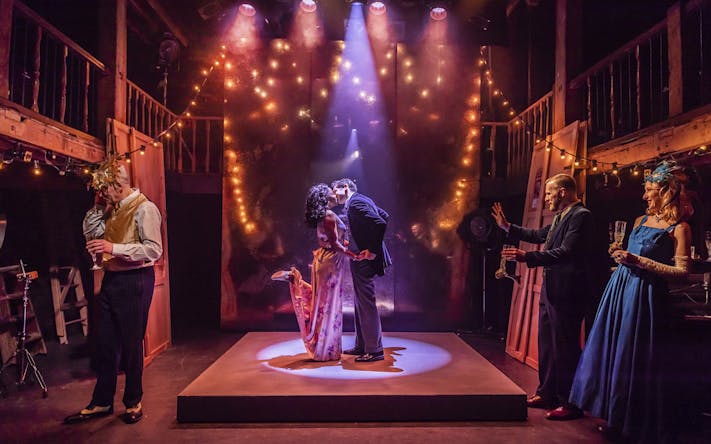Arriving at the Watermill Theatre, recent recipient of The Stage's Theatre of the Year, you will find yourself stepping back to the 40s, with a production of Much Ado About Nothing awash in the music and style of the era. The story of Much Ado is simple, with soldiers returning to war leading to a coupling of the argumentative Beatrice and Benedick and the seemingly more wholesome Hero and Claudio. But, as is often the case, treachery and mistrust lies in wait.
The great strength of Much Ado is the central coupling of Beatrice and Benedick, their spiky exchanges melting into something all together sweetly charming. Katherine Jack and James Mack spar off each other well, both exuding oodles of charisma to become the production's beating heart. The pair of scenes where the individual parts of this duo are tricked into believing the other loves them are the production's stand out moments. These two are at the centre of a fiercely talented ensemble, with the cast's clear line reading keep the audience engaged and the meaning of the text accessible.
Paul Hart's production gives moments to each of the cast to shine. Hayden Wood shapes the role of Dogberry into a properly amusing one, and is placed well during the production's raucous first half. Leigh Quinn takes on three roles and makes each distinctly their own. Priscilla Grace's Margaret may be a more incidental figure but the performer leads many of the musical numbers, bringing a beautiful lyrical quality that feeds into the glamour of the production's design. There are star performances from Thuliswa Magwaza (Hero), Augustina Seymour (a gender-swapped Don John), and Patrick Bridgman (Leonato). And while this is another production of Much Ado that can't quite get beyond the wronging of Hero, that isn't to detract from the turns of Fred Double (Claudio) and Jack Quarton (Don Pedro), particularly during a lighter first half.
There is a degree of artifice to the Watermill's production. Scripts are passed to performers, characters seem to direct proceedings, back drops are added, lights are moved and incorporated into events. If all the world is a stage then this fits neatly with a narrative that is so focused on plots and schemes. The skill here is that Hart's production contains, ironically, a wealth of heart, the warmth that makes the final moments work bathing the audience in a glow of love.
The Watermill is a theatre that knows how to use its space, to adapt it to enhance the text being performed. This is no different for Much Ado, with Ceci Calf's terrific set resembling that of a film studio, the semi-transparent backdrop being used effectively throughout. There is a swirl of glitz and glamour around the production, particularly with the gorgeous costuming. I'm not sure I've seen a Watermill ensemble look as stunning as they do here.
Much Ado About Nothing is the latest triumph from the Watermill Theatre. The return of their ensemble, with another beautifully lyrical Shakespeare production is a joy to watch, even if the production is at its best during its more playful first half. Still, as with the very best of the Bard's comedies, all's well that ends well, with a happy ending to push its audience out the door and back to reality.




